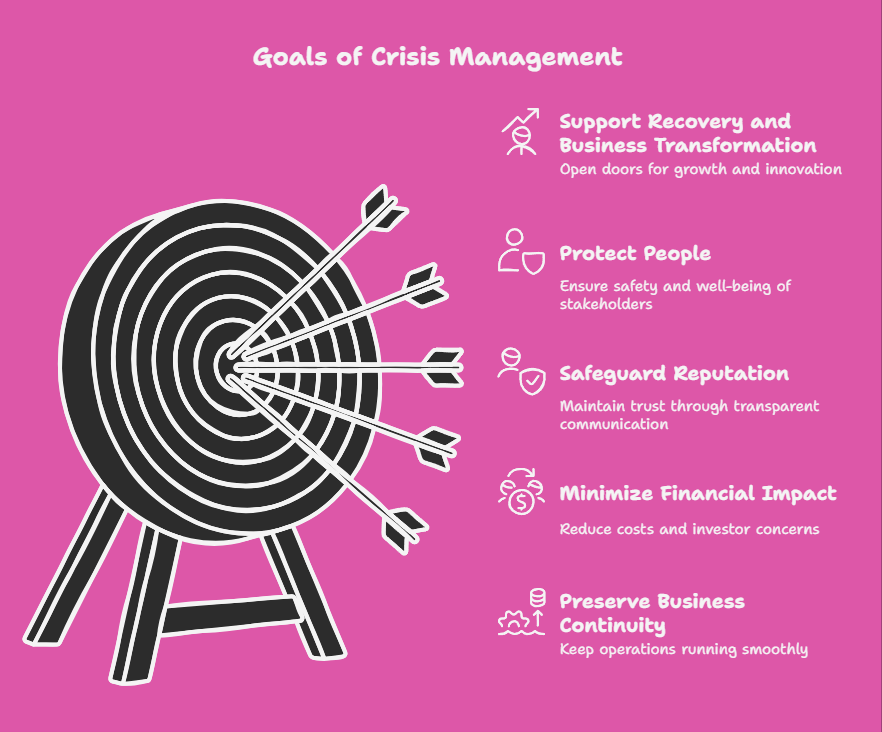Stress spikes. Timelines tighten. News spirals. That’s what a crisis does to a business. In theory, crisis management sounds simple: act fast, fix the mess, save the day. But in real-world UAE boardrooms? It’s anything but. From reputational nightmares to compliance flops, every second counts. And if you’re still figuring it out mid-crisis? We don’t envy you.
That’s why the smartest UAE businesses aren’t hoping for the best. Instead, they are building bulletproof response plans. This is practical resilience at its finest.
In this blog post, we share how to actually protect your business when things go sideways, without losing your cool or your clients.
What is Crisis Management?
To answer the burning question, crisis management definition is the process of preparing for, responding to, and recovering from unexpected events that threaten your company’s operations, people, reputation, or bottom line. In simpler terms? It’s the grown up version of damage control – done right, with a game plan, not panic.
If what you are asking is: what is crisis management in UAE’s context, think of it as the difference between temporary disruption and total downfall. Whether you are bracing for a PR storm, countering a cyber breach, or experiencing a political shake-up, the goal will always remain the same: reduce damage, recover fast, and come out stronger than you were before.
It also pays dividends during audits, investor discussions, and future planning. Why? Because businesses with tested crisis plans are trusted more and bounce back faster.
Why UAE Businesses Can’t Afford to Wing It
UAE is fast paced, hyper connected, and always on. That means a crisis can escalate in minutes and go viral in seconds. Here’s what you’re up against:
- Social media backlash can kill brand trust overnight.
- Data breaches? Bid farewell to client confidence.
- Operational failures? Expect supply chain delays and reputational bruises.
- Legal missteps? Those fines stack up so fast.
And let’s not forget that UAE businesses often operate under tight partnerships, joint ventures, and public-private dealings. A single misstep can echo across your entire network. A solid crisis plan is your lifeline as well as your competitive advantage in these scenarios.
Types of Crisis Management UAE Companies Should Prepare For
Each type of crisis needs its own tailored strategy along with a specialized team. Here are the big hitters that UAE businesses must be ready for:
1. Operational Crisis
This includes equipment failure, supplier breakdown, or any disruption that stops you from doing business. A manufacturing halt due to a system outage or delayed customs clearance can be an example.
2. Financial Crisis
It encompasses cash flow crunches, investment losses, or accounting scandals. An example for this is misreporting revenue or sudden market volatility leading to investor fallout.
3. Technological Crisis
Cyberattacks, system crashes, data theft are part of the technological crisis. For example, a ransomware attack can easily wipe customer databases across multiple locations.
4. Reputational Crisis
These include viral social media backlash, bad press, or public scandals. For instance, a customer complaint about discrimination that gains traction online can bring a PR storm along with reputational damage.
5. Natural and Environmental Crisis
Fires, floods, pandemics, or any natural disasters are included in this type of crisis. A recent example of this crisis is how covid resulted in physical offices being shut down, delaying operations and service delivery.
6. Workplace Violence or HR Crisis
These encompass internal conflict, whistleblower complaints, employee misconduct. A harassment case turning public and attracting media attention can be an example of this.
7. Regulatory or Compliance Crisis
New laws, missed filings, non-compliance penalties are part of the compliance crisis. Late financial submissions resulting in legal notices is an example of this type of crisis.
Understanding these types helps you tailor response protocols and allocate the right team members.
Goals of Crisis Management
You are not just putting out fires. You are protecting the entire structure and maybe even remodeling it while you are at it. Here’s what effective crisis management should do:

1. Preserve Business Continuity
Keep essential functions running without major disruption. That means having alternate locations, off-site backups, and people who know what to do without needing a manual.
2. Minimize Financial Impact
Act fast to reduce long-term costs, whether that’s fines, customer refunds, legal fees, or investor jitters. Budget hits are inevitable, but permanent scars aren’t.
3. Safeguard Reputation
Public trust takes years to build and seconds to break. Clear, honest, and human communication during a crisis saves your brand from long term damage.
4. Protect People
Staff and customer safety comes first. Evacuation plans, remote work setups, health protocols, and mental health support all fall under this goal.
5. Support Recovery and Business Transformation
Once the dust settles, your job isn’t over. A well-managed crisis opens up space for business expansion, tech upgrades, better SOPs, and deeper client loyalty.
Common Mistakes UAE Businesses Make & How to Sidestep Them
Even the best businesses are prone to tripping during a crisis. The key is to learn from what others mess up.
Mistake 1: No Crisis Plan
Thinking “we’ll deal with it when it comes” is the equivalent of bringing a spoon to a sword fight.
Fix: Build a proactive crisis plan. Simulate worst-case scenarios. Assign a trained team with decision-making power.
Mistake 2: Poor Communication
Silence or mixed messages breed nothing but mistrust and speculation.
Fix: Set clear communication protocols. Have pre-approved messaging templates and assign a spokesperson.
Mistake 3: Ignoring Reputation Damage
Fixing operations without fixing public perception is like sealing a leaky pipe and ignoring the water stains.
Fix: Loop in PR, legal, and customer service teams from Day 1 of the crisis.
Mistake 4: No Post-Crisis Review
Skipping a debrief means missing a goldmine of learnings.
Fix: Always conduct a post-crisis review. What worked? What flopped? What needs updating? Seek answers to all these very important questions.
Mistake 5: Over-Reliance on Tech
Automation is great… until it fails.
Fix: Have human backups. Train staff for manual operations if systems go dark.
Crisis Management Standards That Actually Work
Many organizations refer to ISO 22301 as a gold-standard crisis management standard. It outlines how to:
- Spot vulnerabilities in advance
- Run simulations and response drills
- Maintain operations under high stress
Following a standard shows how consistent you are. And when you are consistent in chaos, you win confidence from your clients, your board, and the market.
Business Crisis Management in Action
Let’s say your HR software crashes. Payroll’s on pause. Employees panic. Emails flood your inbox. And it’s Thursday, two days to payday.
Without a crisis plan? You are playing with fire, possibly losing staff trust in the meantime.
With one? You:
- Switch to manual backups
- Alert affected teams immediately
- Activate your external IT partner
- Keep your staff updated hourly
- Inform your bank of possible delays
- Offer advances to impacted employees
That’s business crisis management done right: fast, calm, structured and human.
Crisis Management and Business Growth
Crisis management is the training ground for future leaders and smarter operations. When done right, it becomes the launchpad for business transformation:
- Weak systems get replaced with smarter ones
- Teams become more agile under pressure
- Clients and investors value your resilience
More often than not, your clients won’t remember the problem. What they will remember however is how you made them feel during it. Calm, informed, heard – make sure that’s what they feel. Because that’s what real trust looks like.
Set Up Your Crisis Response with MBS Consultancy
In UAE, where businesses scale fast and stakes run high, crisis management is the ultimate insurance policy. It isn’t about fear. It’s about being smarter and faster than whatever tries to disrupt you. If you are still asking what is crisis management instead of building your plan, let’s change that today. Because the question isn’t if a crisis will hit. It’s when that’s time going to be.
Need help setting up your crisis response? Let’s get your business future-proofed.




